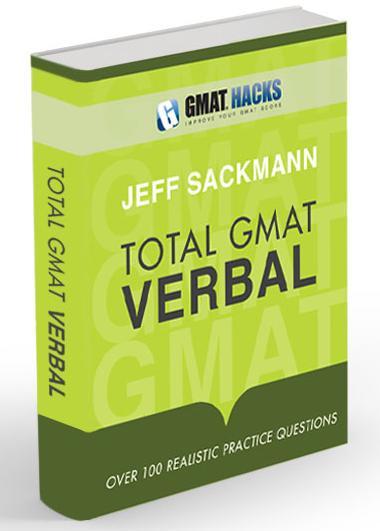
Bookshelf
|
|
Total GMAT Math Jeff's complete Quant guide, on sale now! |
|
|
Total GMAT Verbal Everything you need to ace GMAT Verbal! |
1,800 Practice Math Questions
Buy Jeff's books at Amazon.com

GMAT Official Guide, with IR
OG Math | OG Verbal
OG12 & Quant Rev solutions!
GMAT Question of the Day
Beginner's Guide to the GMAT
GMAT Hacks Affiliate Program

Recent Hacks

Categories
- General Study Tips
- Goals and Planning
- CAT Strategy
- The Mental Game
- GMAT Math Strategy
- GMAT Math Topics
- Mental Math
- Data Sufficiency
- Critical Reasoning
- Reading Comprehension
- Sentence Correction
- Analytical Writing Assessment
- Integrated Reasoning
- IR Explained
- Business School Admissions
- GMAT Prep Resources
- Practice Questions
- Total GMAT Math
- Total GMAT Verbal
- GMAT 111

Short Reading Passages
| You should follow me on Twitter. While you're at it, take a moment to subscribe to GMAT Hacks via RSS or Email. |
Reading Comprehension passages on a GMAT come in a variety of lengths. Skim through the RC section in The Official Guide and you'll find some that are twice as long as others. Most of what I've written in the past is geared toward the challenges of extracting information in a reasonable amount of time from longer passages.
However, there are challenges with short passages as well. Many of the tactics you may rely upon for three- and four-paragraph passages are not as effective on their briefer counterparts.
Characteristics of Short Passages
One notable difference between short and long passages is that short passages often have just one paragraph. This makes it difficult to skim. There are no visual cues to tell you where to find a thesis statement or topic sentence. It might be a long paragraph (as many as eight sentences), so it's easy to get bogged down in the details.
Because the passage is not as long and there are fewer "signpost" sentences, a higher percentage of the passage is devoted to detailed content. This is another reason why skimming rarely works. You may see three or four questions on a short passage, so it's likely you'll be expected to understand just about every detail.
Also, many passages are short to compensate for their conceptual difficulty. Some complex science topics would be too much for GMAT test-takers to handle if they ran 400 words. Instead, the GMAT will give you an equally complex 200-word passage. In the big picture, they're doing you a favor, but it does mean that, on average, short passages cover more complicated content.
Handling Short Passages
When confronted with a short passage, don't try to rush through it. Expect to spend nearly as long reading and analyzing a 200-word passage as you would a 400-word passage. As I've noted, the difficult of the topic may make it just as challenging.
As you read through the short passage, make more of an effort to understand every sentence. In a longer passage, you can often get away with skipping a sentence here and there if the concept or vocabulary is unfamiliar. In a short passage, there may only be eight sentences; do you think you'll be able to escape without understanding more than 10 percent of the entire passage?
When you work through the questions, except fewer "big picture" questions and more inference questions. You may be required to combine the information from two or three sentences in a way you hadn't expected. Again: Because there's less content in the passage, more of it is likely to be more complex.
With practice, you can handle short GMAT Reading Comprehension passages just as readily as the longer ones. But don't expect a free pass just because there's only one paragraph!
About the author: Jeff Sackmann has written many GMAT preparation books, including the popular Total GMAT Math, Total GMAT Verbal, and GMAT 111. He has also created explanations for problems in The Official Guide, as well as 1,800 practice GMAT math questions.
 |
Total GMAT Verbal
The comprehensive guide to the GMAT Verbal section. Recognize, dissect, and master every question type
you'll face on the test. Everything you need, all in one place, including 100+ realistic practice questions. |